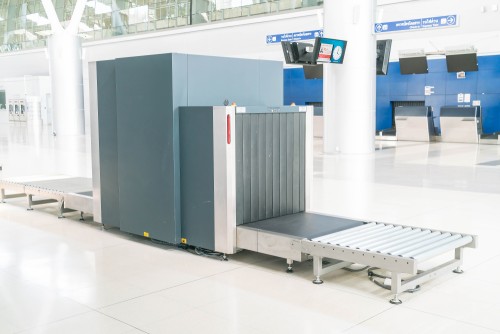Airport security screening is a vital part of the travel experience. But long queues and a tedious manual process frustrate passengers.Additionally, human errors are a significant concern at checkpoints. Security screeners spend a lot of time staring at screens, which can exhaust them and lead to cloudy judgement.

AI-Powered Scanners Increase Efficiency
AI elevates scanning beyond a simple digitization process, making it a powerful tool for data analysis, automation, and precision. This transformation allows businesses to streamline document management, strengthen security, and improve efficiency across multiple industries. With Optical Character Recognition (OCR) algorithms, AI-enhanced scanners convert physical documents into digital files with editable text that can be easily searched and categorized for access in a matter of seconds. This automation minimizes human error and expedites processing time, allowing for greater productivity.
Additionally, AI-enhanced scanners can detect and correct issues in scanned images such as skew or contrast, ensuring the integrity of the information. This is essential for divisions that rely on accurate, precise data such as healthcare or finance. With advanced 3D scanning, AI-enhanced systems offer new possibilities for leveraging scanned data in different industries. For example, facial and emotion scanning can enable virtual try-on experiences or personalized fitness programs, while body scanning can aid in medical diagnostics and other quality assurance tasks. In turn, this leads to improved operational efficiency, higher standards, and customer satisfaction.
AI-Powered Scanners Detect Threats
In a security context, AI is capable of analysing data and detecting threats faster than human inspectors. This makes it a valuable partner in airport security and improves safety outcomes, boosts operational efficiency, and improves passenger satisfaction.
In addition, AI-powered scanners can detect metallic and non-metallic weapons hidden in luggage and under clothing. This makes it possible to reduce the number of items that need to be manually searched and potentially allow passengers to keep electronics, liquids, and laptops in their carry-on bags during the screening process. BaggageAI, provides a powerful tool that allows airports to automate their baggage and passenger screening processes. Powered by advanced machine learning, the solution is capable of scanning 30 images per second and offers high-speed threat detection without affecting AMC performance. Additionally, the solution uses the latest in data security features and controls to protect against cyber-attacks. It also has a low energy consumption that helps airports achieve their sustainability goals, while lowering the noise and heat emissions that can cause discomfort for passengers.
AI-Powered Scanners Increase Security
By automating repetitive, manual tasks and enabling real-time processing of data, AI reduces human error and speeds up the time it takes to process and extract information. This allows airport staff to devote more of their attention to critical security and customer service issues. Using predictive analytics, AI can alert staff to suspicious activities and proactively escalate screening protocols for high-risk passengers. This “risk-based” approach enhances security and minimizes inconvenience for frequent travelers, while allowing for more thorough investigations of those who raise red flags.
Moreover, by monitoring passenger movement across the airport, AI can help airlines predict and avoid bottlenecks. This enables them to more efficiently route passengers through the terminals and to retail areas. Dallas-Fort Worth, for example, uses an AI-powered solution called AeroCloud Optic to anonymously track passenger flow, identify queue trends, predict waiting times, and alert security teams of potential congestion. AI can also be used to ensure that people who board flights are the ones they claim to be by matching biometrics with their travel documents. However, airports must be careful not to use biased algorithms that may discriminate against certain groups. Regular audits and adjustments are key.
AI-Powered Scanners Boost Operational Efficiency
With the help of AI, airports are able to streamline their operations and improve the customer experience. By analysing passenger movement patterns, AI-powered systems can identify bottlenecks and optimize queue management – with a view to making the journey through the airport safer and more efficient for all.
In addition, AI-powered solutions can help to reduce the number of false alarms. For example, if a bag has been left unattended for a long time, an AI system could alert staff to the matter and even trace the owner. AI can also be used to speed up the screening process, helping to cut waiting times. For instance, airports can use facial recognition technology to identify passengers and eliminate the need for them to present their passports and boarding cards. This is especially important as it allows airports to provide a more efficient and less physically intrusive pre-flight experience for all travellers. However, it’s critical that algorithms are rigorously tested to ensure that they do not discriminate against certain groups and individuals. Furthermore, those who are uncomfortable with the use of AI should have the option to opt-out – while still being subject to traditional security checks.
AI-Powered Scanners Enhance Customer Experience
A seamless travel experience for passengers is a high priority for airports. As such, they need to find innovative ways to improve the customer experience and drive operational efficiency – and AI is one tool that has the potential to do just that.
Traditional security screenings require the use of X-ray machines to detect prohibited items, which can be slow and prone to error. AI-powered scanners can automatically identify and flag dangerous items, speeding up the process significantly. Moreover, it helps reduce the need to remove liquids and electronics from luggage for inspection, which can save time and hassle for passengers.
Furthermore, AI-powered scanners can help airports monitor passenger activity in real-time to spot suspicious behavior. This can be used to prevent identity theft, as well as to prevent the theft of luggage and belongings by identifying abandoned baggage. The technology can also alert airport staff when a bag has been left lingering for too long, which can prevent passenger frustration and help police track down the culprit. Moreover, the technology can scan and match passenger biometrics with their travel documents to verify identities.